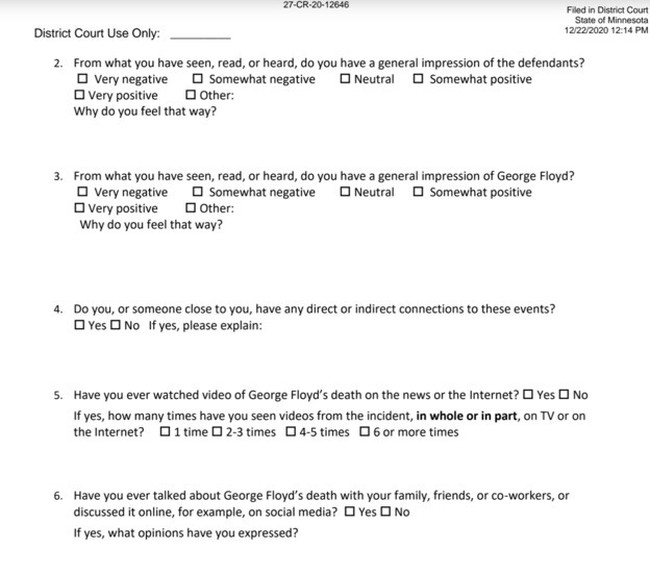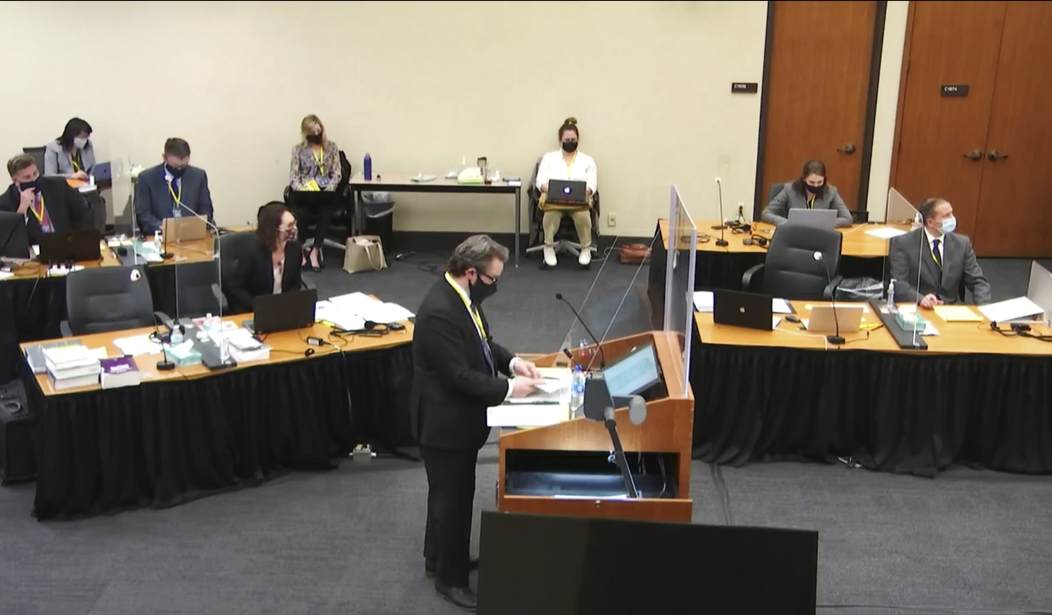The jury hearing the case against former Minneapolis police officer Derek Chauvin soon will get the case amid the chaos of news conferences, protests, and riots happening outside as PJ Media reported.
Every day, jurors pass boarded-up windows, step past the fencing meant to keep out rioters and looters, and walk the gauntlet of National Guard troops and armored vehicles to make their way safely into the courthouse to listen to another day of testimony.
The jurors’ faces have never been shown on the three-camera video feed from the courtroom, not even during jury selection. No one knows who they are unless either they’ve told someone or an observer has stood near the secret door where they come in and out every day.
Who are these 15 people chosen to be jurors and alternates in this highly-charged case?
Generally speaking, they’re younger and more racially varied than most juries in Minnesota.
Recommended: Former Cop Chauvin Won’t Testify, Defense Rests in Death of George Floyd. Now, About Those Riots…
Hennepin County is 17% black or multiracial and 74% white. Half of the jurors chosen in the case are non-white. The jury of 12 jurors and three alternates is made up of three black men, one black woman, and two self-identified “multiracial” people with the rest of them white. Two of the black male jurors are immigrants to the U.S.
#DerekChauvinTrial for #GeorgeFloyd #jury so far: pic.twitter.com/M0Gyp3ABPq
— MisterTee (@MergeRight123) March 17, 2021
They are a decidedly younger jury than usual. Ten of the jurors are under 50 years old, one is in his 20s, and five are 50 or older with the oldest being in his 60s.
Recommended: Prosecution Rests in Chauvin Trial and the Jury Is Told to ‘Pack a Bag’
One juror is a cardiac nurse, which is an interesting choice considering so much of the evidence in the case has to do with Floyd’s heart and lungs and she may rely on her own knowledge instead of the evidence put forward by medical experts.
Jurors were asked to fill out a questionnaire when they were considered.
KARE 11 TV news reports that the questionnaire never uses the word “riot” and.
The questionnaire is 14 pages long and is broken into sections including: Knowledge of the Case, Media Habits and Police Contacts.
The potential jurors were specifically asked: Have you ever watched video of George Floyd’s death on the news or the Internet? If yes, how many times?
The questionnaire does not use the word “riot.” It asks whether they or someone close to them participated in demonstrations or marches against police brutality – and whether they know someone who was injured or suffered property damage during the protests.
The follow-up question on that topic: Do you believe your community has been negatively or positively affected by any of the protests that have taken place in the Twin Cities area since George Floyd’s death?
Here’s a look at part of the document.

The questionnaire also asks about the Black Lives Matter movement, about Blue Lives Matter (a pro-police take on the motto), and about efforts to defund the police.
The BBC provides some insight into the backgrounds of the jurors.
It includes a black grandmother in her 60s, the oldest member of the jury, who said she stopped watching the infamous video of Mr Floyd’s death because “it just wasn’t something I needed to see”. She also claimed she used to live 10 blocks from where he had died.
Others too admitted that they found the video difficult to watch, with one newly-wed white woman, a social worker in her 20s, saying “I had every emotion”.
A white woman in her 50s claimed she used to work at a suburban business damaged last summer after Mr Floyd’s death. She had seen the video, but said she generally trusted the police and felt that those who followed instructions had nothing to fear.
A black man in his 40s said that, while he believed minorities are mistreated regularly by the police, he strongly disagreed with defunding – or redirecting funds away from – police departments.
A lot is riding on their verdict.
The Floyd family attorney has stated that the verdict is a “referendum on cops killing black people.”
Recommended: Riots After the Duante Wright Shooting Show Just How Much of a Powder Keg Minneapolis Is Right Now
Vote to acquit and there will be riots. Vote to convict and there may be riots. This specter of violence is well beyond the heckler’s veto. Somebody could get killed here. Besides the men at the center of this case, Chauvin and his attorney, other lives may ride on the verdict rendered.
And you can see why. After the apparent accidental shooting of Duante Wright, the officer involved had to flee her home. A city council woman admitted she’d voted to oust the city manager who simply called for the cop to get “due process” because she feared “personal repercussions” [read: the mob].
What is this, Medellín, Minnesota?
Chauvin’s attorney, Eric Nelson, may have to watch his back, no matter what happens. You don’t want to say these things out loud, but obviously, there’s a mob forming on a daily basis outside the courthouse and there’s a reason for the fortifications surrounding the complex.
The jury has been through 14 days of testimony and on Monday, it will hear closing arguments in the case. The defense used fewer than three days to present its case.
Chauvin’s legal team has one attorney in the courtroom, Eric Nelson, who is aided by an evidence clerk. Chauvin sits next to him, separated by plexiglass, while taking notes.
The dozen prosecutors from Minneapolis law firms and white-shoe law firms around the country, many of whom have volunteered their time to prosecute the cop. There are 14 prosecutors if you count Attorney General Keith Ellison and his number two at the AG’s office. Ellison selected the prosecution team.
Today's thread for the Chauvin trial developments.
CourtTV just confirmed as of today, the prosecution team consists of 14 lawyers (pic) vs Chauvin's one defense attorney.Twelve potential jurors will be questioned today to try and fill the last seat before trial on Monday. pic.twitter.com/8j9wMSpYF4
— CrimeWatchMpls (@CrimeWatchMpls) March 23, 2021
Recommended: Officer Chauvin’s Knee Was NOT on George Floyd’s ‘Neck’ and 8 Other Things You Didn’t Know About This Case
The jurors have been told to pack a bag.
They may want to pack more than that.










Join the conversation as a VIP Member